BBG Watch Commentary
The U.S.-China Economic and Security Review Commission‘s findings on Guo Wengui and Voice of America (VOA) may prompt more questions about corporate investments of Broadcasting Board of Governors (BBG) and VOA officials in China. The Commission, created by the U.S. Congress, concluded that China has engaged in discrediting of Chinese businessman whistleblower Guo Wengui in international media. The bipartisan Commission devoted an entire insert to describing how the Voice of America team of senior managers led by VOA director Amanda Bennett ordered the shortening of the VOA Mandarin Service live interview with Guo Wengui on April 19, 2017. The Commission used one of BBG Watch reports as a reference for its 2017 Report to Congress.
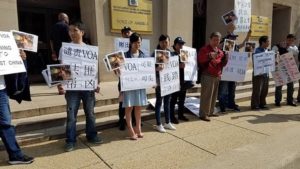
Amanda Bennett categorically denies that pressure from the Chinese government had anything to do with her decision and claims that it was “intended to enforce best industry-wide journalistic practices.” She is reportedly trying to fire three of the VOA Mandarin Service journalists who disagreed with her decision on Guo Wengui. The International Federation of Journalists (IFJ), the world’s largest organization of journalists, has asked for an explanation for the proposed firing of three VOA Chinese journalists.
The senior management’s decision to shorten the Guo Wengui interview caused VOA to lose much of its reputation and credibility in China. “I see the damage to our reputation. It’s unbelievable,” a VOA Mandarin Service journalist told Amanda Bennett in meeting with the staff last May. “I’ve been working here for 20 years and I have never seen such a PR crisis. Really. I have never seen anything like this. The anger and the frustration of our audience,” she told Bennett. Chinese Americans and media freedom activists staged protests in front of the Voice of America building in Washington, DC, including a mock funeral for VOA. They also started a legal defense fund for the VOA journalists.
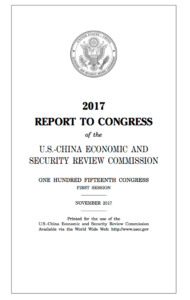 The U.S.-China Economic and Security Review Commission has issued its annual 2017 Report to Congress in which it warned that “The investment activities of large, Chinese Communist Party-linked corporations in the U.S. media industry risk undermining the independence of film studios by forcing them to consider self-censorship in order to gain access to the Chinese market.”
The U.S.-China Economic and Security Review Commission has issued its annual 2017 Report to Congress in which it warned that “The investment activities of large, Chinese Communist Party-linked corporations in the U.S. media industry risk undermining the independence of film studios by forcing them to consider self-censorship in order to gain access to the Chinese market.”
This warning is particularly worrisome for many observers of the Voice of America and other U.S. government-funded international media outlets since of some of the past and present members of the Broadcasting Board of Governors, the federal agency in charge of these activities, including one former BBG chairman and a former acting BBG chairman, are known to be Hollywood film executives who have done substantial business in both communist China and in some cases in Putin-controlled Russia. They and their official U.S. government role in the BBG were not specifically mentioned in the Commission’s 2017 Report to Congress, but the report dwelt at length on China’s influence over the U.S. film industry. The following recommendations and other findings can be found in the full report.
U.S.-CHINA ECONOMIC AND SECURITY REVIEW COMMISSION: • Congress require the U.S. Department of Commerce to collect information from U.S. companies that do business in China concerning requests from the Chinese government regarding censorship, surveillance, and data transfers, and report its findings to Congress.
• Congress modify U.S. Federal Communications Commission regulations to require greater transparency regarding Chinese government ownership of media outlets and the clear labeling of media content sponsored by the Chinese government.
In its 2017 Report to Congress, the Commission did not go into specific details of business dealings between Hollywood and China, but The Los Angeles Times reported for example in February 2016 that Jeff Shell, chairman of Universal Filmed Entertainment Group, announced that “Beijing-based video game maker Perfect World has agreed to invest in Universal Pictures’ movies, marking the latest deal between a Hollywood studio and a Chinese company.” According to The Los Angeles Times, the deal was worth $450 million. Jeff Shell was at the time Democratic chairman of the BBG Board. He is currently still a member of the bipartisan BBG Board. After Donald Trump became president, the BBG Board has Republican chairman Kenneth Weinstein, President and CEO of the Hudson Institute. Neither Shell nor Weinstein are mentioned by name or their BBG roles in the 2017 Report to Congress, but the report includes a section on the controversy over the cancellation of Guo Wengui’s press conference at the Hudson Institute. The report notes that the Hudson Institute denied making its decision under pressure from China. The report provides examples of pressure tactics used by the Chinese government representatives against the Hudson Institute. The report does say that “China is now a major target audience for U.S. film studios.” The report quotes Donna Langley, chairman of Universal Pictures, as telling the Hollywood Reporter in October 2016 that “China is very important to the movie industry today. The number of movie theaters and filmgoers … [is] extraordinary.” The report also says that according to the Wall Street Journal, “Hollywood has become so entangled with China that the movie industry can’t run without it,” since Chinese ticket sales continue to increase rapidly while U.S. sales remain flat.” Universal Pictures (also referred to as Universal Studios or simply Universal) is an American film studio owned by Comcast through the Universal Filmed Entertainment Group division of its wholly owned subsidiary NBCUniversal.
Although this information was also not specifically mentioned in the Commission’s 2017 Report to Congress, the spouse of the current VOA director Amanda Bennett is believed to have substantial corporate investments in China.
Such business links between some of BBG and VOA officials and China were questioned recently by Ann Noonan, Executive Director of the independent and non-partisan Committee for U.S. International Broadcasting (CUSIB-cusib.org) and by the signatories of the open letter, including Chen Guangcheng, a blind Chinese human rights lawyer living in exile in the United States, and other activists in the United States working for human rights and women’s rights in China.
The U.S.-China Economic and Security Review Commission concluded that “China’s overseas influence operations to pressure foreign media have become much more assertive. In some cases, even without direct pressure by Chinese entities, Western media companies now self-censor out of deference to Chinese sensitivity.”
In the same 2017 Report to Congress, the Commission pointed out that China has engaged in China’s discrediting of Guo Wengui in international media. Guo Wengui is a Chinese real estate tycoon living in the United States since 2015 who began to publicly criticize the effectiveness of the Chinese Communist Party’s anticorruption campaign and alleged high-level corruption in the CCP.
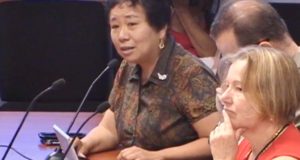
In April 2017, Voice of America’s Chinese-language service conducted a live interview with Mr. Guo in which he made new allegations of corruption involving powerful Party officials. After the Chinese government protested against the already scheduled and announced three-hour live TV and social media interview, senior VOA officials reportedly ordered that the live interview be canceled. When they met with resistance from VOA Mandarin Service journalists, VOA executives reportedly reluctantly agreed that the planned live interview should run no longer than 15 minutes. They reportedly also told VOA Mandarin service journalists to avoid asking questions that could result in allegations being made by Guo Wengui against Chinese communist officials because these officials could not respond to them in a live interview. Senior VOA executives led by director Amanda Bennett reportedly told VOA Mandarin journalists that they could pre-record the rest of the interview so it could be reviewed before being broadcast later. However, fearing censorship, Guo Wengui would only agree to be interviewed live.
This is how the Voice of America management responded recently to the Guo Wengui incident with an official statement:
VOICE OF AMERICA MANAGEMENT: We cannot comment on ongoing personnel matters to protect the privacy of the individuals involved. However, what we can share is that the Broadcasting Board of Governors retained Gordon Rees Scully Mansukhani, LLP, to conduct an investigation into the April 2017 VOA Mandarin service broadcast of an interview with Chinese dissident Guo Wengui. As part of the process, Gordon Rees also retained Mark Feldstein of the University of Maryland’s Philip Merrill School of Journalism to conduct an independent investigation of the journalistic practices used in the April 2017 VOA Mandarin service broadcast. The investigations found that VOA management’s actions were not in any way driven by pressure from the Chinese government, but instead were intended to enforce best industry-wide journalistic practices. While we cannot release the investigations, as is the usual practice in these cases, copies of the documents relied upon have been provided to the people in question.
This is how the U.S.-China Economic and Security Review Commission reports in its 2017 annual report on the VOA Guo Wengui interview incident.
U.S.-CHINA ECONOMIC AND SECURITY REVIEW COMMISSION: Although the interview was advertised beforehand as scheduled to run for three hours, VOA cut off the interview early after Mr. Guo made new corruption allegations, citing a prior agreement to only air one hour of it. According to Dr. Gong, the Chinese Foreign Ministry complained to VOA’s Beijing correspondent that the interview would “disturb” China’s upcoming 19th Party Congress in October 2017, and the Ministry threatened to “respond seriously” if the interview proceeded. Dr. Gong refused to cancel the interview but said VOA’s upper management ordered that it run for “no longer than 15 minutes,” although it ultimately ran for one hour and 19 minutes, after which Dr. Gong and four colleagues were suspended without pay. [BBG Watch: They were in fact placed on paid administrative leave.]
The Commission also reported:
The U.S.-China Economic and Security Review Commission was created by the United States Congress in October 2000 with the legislative mandate to monitor, investigate, and submit to Congress an annual report on the national security implications of the bilateral trade and economic relationship between the United States and the People’s Republic of China, and to provide recommendations, where appropriate, to Congress for legislative and administrative action. The Commission is composed of 12 members, three of whom are selected by each of the Majority and Minority Leaders of the Senate, and the Speaker and the Minority Leader of the House. The Commissioners serve two-year terms.
Carolyn Bartholomew was elected as Chairman of the Commission for the 2017 report cycle. Former Chief of Staff, Counsel, Legislative Director, and Foreign Policy Advisor to U.S. House of Representatives Democratic Leader Nancy Pelosi; former Professional Staff Member on the House Permanent Select Committee on Intelligence. Commissioner Bartholomew served as the Commission Chairman for the 2007 and 2009 report cycles, and served as Vice Chairman for the 2006, 2008, 2010, and 2016 report cycles. Reappointed by House Democratic Leader Nancy Pelosi for a two-year term expiring December 31, 2017.
Hon. Dennis C. Shea was elected as Vice Chairman of the Commission for the 2017 report cycle. Government and public policy attorney, former director of policy for the Bob Dole for President campaign; former Assistant Secretary for Policy, Development and Research, U.S. Department of Housing and Urban Development. Reappointed by the Senate Republican Leader Mitch McConnell for a term expiring December 31, 2018.
2017
REPORT TO CONGRESS
of the
U.S.-CHINA ECONOMIC AND SECURITY REVIEW COMMISSION
ONE HUNDRED FIFTEENTH CONGRESS FIRST SESSION
NOVEMBER 2017
SECTION 5: CHINA’S DOMESTIC INFORMATION CONTROLS, GLOBAL MEDIA INFLUENCE, AND CYBER DIPLOMACY
(…)
China’s Discrediting of Guo Wengui in International Media
In March 2017, Guo Wengui, a Chinese real estate tycoon living in the United States since 2015, began to publicly criticize the effectiveness of the CCP’s anticorruption campaign and allege high-level corruption in the CCP.185 Chinese state-run media called him a “criminal suspect” and launched an international publicity campaign, including releasing a videotaped confession by a former senior intelligence official accusing Mr. Guo of corruption and uploading videos to YouTube on a channel called “Truth about Guo Wengui,” to discredit him.186 In an unbylined* story, the South China Morning Post called the campaign “unprecedented” and “unusually sophisticated,” and Professor Xiao testified to the Commission that he had “never seen something like this.”187 After Mr. Guo threatened to drop a “nuclear bomb” of corruption allegations involving relatives of powerful CCP officials in April 2017, the Chinese government asked the International Criminal Police Organization (INTERPOL) to issue a red notice† for Mr. Guo.188 Meng Hongwei, a former Chinese vice-minister of public security, has been president of INTERPOL since November 2016.189 According to Foreign Policy’s Bethany Allen-Ebrahimian, countries such as Russia, Turkey, and China issue “politically motivated red notices against dissidents, activists, and journalists,” and she argues the timing in this case suggests that “China’s motive is purely political and that INTERPOL is in danger of becoming an extension of the increasingly long reach of the Chinese state.”190 In August 2017, the Associated Press reported that Chinese police had requested a second INTERPOL arrest notice for Mr. Guo.191
Chinese social media mentions of the story in April were heavily censored: FreeWeibo.com, a site that tracks censored posts on Weibo, listed Mr. Guo as the top censored subject in the week prior to April 20.192 Mr. Guo’s Facebook and Twitter accounts were briefly suspended, raising concerns of pressure by Chinese offcials.193 GreatFire, an anticensorship activism organization, claimed the Chinese government had targeted Mr. Guo’s Twitter account with a direct denial of service‡ (DDoS) attack.194 Charlie Smith, GreatFire’s cofounder, told the Commission in September 2017 that this cyber attack was still ongoing.195
*According to National Public Radio, a byline—the line at the top of an article naming the author—is an important part of transparency, and “transparency fosters accountability.” For example, when the South China Morning Post published an interview with a detained Chinese legal assistant, David Bandurski noted the lack of a byline and said that questionable details of the article, including the refusal by the paper’s senior staff to clarify how they arranged an interview with a detained person, raised “very serious questions about the newspaper’s commitment to editorial independence.” Sara Goo, “Guidance for Bylines on NPR.org,” National Public Radio, March 1, 2017; David Bandurski, “The Mea Culpa Machine,” China Media Project, July 15, 2016.
†According to INTERPOL, a red notice is “a request to locate and provisionally arrest an individual pending extradition. It is issued … at the request of a member country or an international tribunal based on a valid national arrest warrant. It is not an international arrest warrant. INTERPOL cannot compel any member country to arrest an individual who is the subject of a Red Notice. Each member country decides for itself what legal value to give a Red Notice within their borders.” INTERPOL, “Red Notices,” 2017.
‡A DDoS is a type of cyber attack designed to force a server to shut down by overwhelming it with requests for information from multiple sources in a coordinated fashion. Kim Zetter, “Hacker Lexicon: What Are DoS and DDoS Attacks?” Wired, January 16, 2016.
China’s Discrediting of Guo Wengui in International Media—Continued
In April 2017, Voice of America’s (VOA) Chinese-language service conducted a live interview with Mr. Guo in which he made new allegations of corruption involving powerful Party officials, claiming “If [Chinese officials] weren’t so corrupt, they wouldn’t be scared” of him.196 According to VOA’s Mandarin Service Chief, Sasha Gong, Mr. Guo explained during a pre-interview that he paid for “office rentals, private jets, surveillance systems, personnel, and many other expenses” for Chinese security services personnel in exchange for their help in “dealing with his business rivals.”197 Although the interview was advertised beforehand as scheduled to run for three hours, VOA cut off the interview early after Mr. Guo made new corruption allegations, citing a prior agreement to only air one hour of it.198 According to Dr. Gong, the Chinese Foreign Ministry complained to VOA’s Beijing correspondent that the interview would “disturb” China’s upcoming 19th Party Congress in October 2017, and the Ministry threatened to “respond seriously” if the interview proceeded.199 Dr. Gong refused to cancel the interview but said VOA’s upper management ordered that it run for “no longer than 15 minutes,” although it ultimately ran for one hour and 19 minutes, after which Dr. Gong and four colleagues were suspended without pay[They were suspended with pay].200
Mr. Guo claimed the interview had been sabotaged by a Chinese state-affliated “liaison person” within VOA.201 Dr. Gong wrote in the Wall Street Journal that she was “not aware of another instance in the 75-year history of [VOA] in which a foreign government has attempted to intervene with such force in the network’s broadcast decisions.”202 She told CNBC she suspected “somebody [at VOA] caved in to the Chinese government’s demand, because the timing itself was very suspicious … Someone very, very powerful must be very, very afraid of this.”203 In June, CNBC reported James McGregor, chairman of Greater China for communications consultancy APCO Worldwide, had been appointed by the Broadcasting Board of Governors to investigate whether VOA had been pressured by Beijing, although VOA director Amanda Bennett denied that pressure from Beijing had influenced VOA’s decision.204 In June, Secretary of State Rex Tillerson said he would support an investigation by the U.S. State Department Inspector General into whether VOA had been pressured by Beijing if it was deemed necessary.205 In late August, four members of Congress, including the co-chairs of the Congressional-Executive Commission on China, sent a letter to the Office of the U.S. Department of State Inspector General and the Broadcasting Board of Governors to request an investigation into the matter.206
The Chinese government began trying associates of Mr. Guo in June, marking the first official allegations made.207 According to the Wall Street Journal, the authorities “went to unusual lengths to open the proceedings to public view” by posting videos of the proceedings in addition to transcripts, emphasizing the degree to which the publicity campaign remained in full force.208 Three employees of Beijing Pangu Investment, one of Mr. Guo’s companies, were convicted of fraud.209 In September 2017, Mr. Guo applied for political asylum in the United States because his allegations against Chinese officials had made him “a political opponent of the Chinese regime,” according to his then lawyer.210
China’s Discrediting of Guo Wengui in International Media—Continued
Later in September, after Mr. Guo posted additional personal details of Chinese officials on Facebook, the company blocked his profile and an associated page due to violations of its terms of service, according to a Facebook spokesperson.211 In late September, the Hudson Institute, a think tank in Washington, DC, announced plans to host Mr. Guo for an invitation-only speaking event in early October, but the event was abruptly postponed the day before it had been scheduled to occur.212 According to the Wall Street Journal and Mr. Guo, Hudson Institute staff—including at least one scholar with a pending visa application for a trip to China—received telephone calls from the Chinese Embassy pressuring them not to go through with the event.213 David Tell, director of public affairs at the Hudson Institute, told the Commission the event was postponed not due to pressure from Beijing but because Hudson staff “weren’t able to pull together the event on short notice,” citing complications such as the need for heavy security.*214 According to internal Hudson Institute e-mails reviewed by the Commission, at least two senior Hudson staff said they received telephone calls from the Chinese Embassy, and one senior fellow said a “counselor” from the Embassy “asked about [the senior fellow’s] entry visa application [to China]”; the counselor claimed hosting Mr. Guo would “embarrass [the] Hudson Institute and hurt [its] ties with the Chinese government.”215
185. Chun Han Wong and Felicia Schwartz, “China Wants Fugitive Guo Wengui Back—but He’s Applied for U.S. Asylum,” Wall Street Journal, September 7, 2017; Josh Rudolph, “The Publicity War between Beijing and Guo Wengui,” China Digital Times, April 21, 2017; Michael Forsythe, “As Trump Meets Xi at Mar-a-Lago, There’s a ‘Wild Card,’ ” New York Times, April 4, 2017.
186. Michael Forsythe and Alexandra Stevenson, “The Billionaire Gad y in Exile Who Stared Down Beijing,” New York Times, May 30, 2017; Chun Han Wong, “Chi- nese Tycoon on His High-Level Corruption Claims: ‘Everything Is Just Getting Started!’ ” Wall Street Journal, May 3, 2017; South China Morning Post, “China Launches Unprecedented International Publicity War against Wanted Tycoon Guo Wengui,” April 20, 2017.
187. U.S.-China Economic and Security Review Commission, Hearing on China’s Information Controls, Global Media Influence, and Cyber Warfare Strategy, oral testimony of Xiao Qiang, May 4, 2017; South China Morning Post, “China Launches Unprecedented International Publicity War against Wanted Tycoon Guo Wengui,” April 20, 2017.
188. Michael Forsythe, “China Seeks Arrest of Billionaire Who Accused Officials’ Relatives of Graft,” New York Times, April 19, 2017.
189. BBC, “Chinese Official Meng Hongwei to Head Interpol,” November 10, 2016.
190. Bethany Allen-Ebrahimian, “Interpol Is Helping Enforce China’s Political Purges,” Foreign Policy, April 21, 2017.
191. Steven Lee Myers and Chris Horton, “Emboldened China Wields Its Laws to Silence Critics from Abroad,” New York Times, September 20, 2017; Gerry Shih, “AP Exclusive: China Accuses Outspoken Tycoon in US of Rape,” Associated Press, September 1, 2017.
192. Mimi Lau, “How the Social Media Buzz in China and the West Differ over Wanted Tycoon Guo Wengui,” South China Morning Post, April 21, 2017.
193. Samuel Wade, “Tycoon’s Facebook, Twitter Accounts Suspended,” China Digital Times, April 27, 2017; Michael Forsythe, “He Tweeted about Chinese Government Corruption. Twitter Suspended His Account,” New York Times, April 26, 2017; Paul Mozur, “Facebook Brie y Suspends Account of Outspoken Chinese Billionaire,” New York Times, April 21, 2017.
194. Charlie Smith, “Is China Establishing Cyber Sovereignty in the United States?” GreatFire, May 23, 2017.
195. Charlie Smith, cofounder, GreatFire, interview with Commission staff, September 25, 2017.
196. Michael Forsythe, “China Seeks Arrest of Billionaire Who Accused Of cials’ Relatives of Graft,” New York Times, April 19, 2017.
197. Sasha Gong, “How China Managed to Muffle the Voice of America,” Wall Street Journal, May 23, 2017.
198. Nectar Gan, “Wanted Chinese Tycoon Guo Wengui Blames ‘Spy’ in US Broadcaster Voice of America for Pulling Plug on Interview,” South China Morning Post, April 22, 2017; Robert Delaney, “Plug Pulled on US Interview with Wanted Chinese Tycoon Guo Wengui,” South China Morning Post, April 20, 2017.
199. Sasha Gong, “How China Managed to Muffle the Voice of America,” Wall Street Journal, May 23, 2017.
200. Sasha Gong, “How China Managed to Muffle the Voice of America,” Wall Street Journal, May 23, 2017.
201. Nectar Gan, “Wanted Chinese Tycoon Guo Wengui Blames ‘Spy’ in US Broadcaster Voice of America for Pulling Plug on Interview,” South China Morning Post, April 22, 2017.
202. Sasha Gong, “How China Managed to Muffle the Voice of America,” Wall Street Journal, May 23, 2017.
203. Evelyn Cheng, “How an Interview with One Chinese Billionaire Threw a US Broadcaster into Turmoil,” CNBC, June 9, 2017.
204. Evelyn Cheng, “How an Interview with One Chinese Billionaire Threw a US Broadcaster into Turmoil,” CNBC, June 9, 2017.
205. Bill Gertz, “Congress Seeks IG Probe of VOA China Interview,” Washington Free Beacon, June 15, 2017; C-SPAN, “Secretary Tillerson Supports OIG Investigation of Voice of America China Controversy,” June 13, 2017.
206. Marco Rubio et al., letter to Steve A. Linick, August 28, 2017. https://bbgwatch.com/wpcontent/uploads/2017/09/8-28-17-Letter-re-VOA-congressional-letter.pdf
207. Bill Gertz, “Congress Seeks IG Probe of VOA China Interview,” Washington Free Beacon, June 15, 2017; C-SPAN, “Secretary Tillerson Supports OIG Investigation of Voice of America China Controversy,” June 13, 2017.
208. Josh Chin, “China Cranks Up Heat on Exiled Tycoon Guo Wengui,” Wall Street Journal, June 9, 2017.
209. Alice Woodhouse, “Three Linked to Exiled Billionaire Guo Wengui Sentenced in China,” Financial Times, June 16, 2017.
210. Michael Forsythe, “Billionaire Who Accused Top Chinese Of cials of Corruption Asks U.S. for Asylum,” New York Times, September 7, 2017.
211. Cezary Podkul and Chun Han Wong, “Chinese Fugitive Guo Wengui Amasses War Chest to Battle Beijing,” Wall Street Journal, October 3, 2017; Alexandra Stevenson, “Facebook Blocks Chinese Billionaire Who Tells Tales of Corruption,” New York Times, October 1, 2017
212. Hudson Institute, “POSTPONED – A Conversation With Guo Wengui,” October 4, 2017; Hudson Institute, “A Conversation with Guo Wengui – by Hudson Institute Event,” September 22, 2017.
213. Cezary Podkul, Kate O’Keefe, and Aruna Viswanatha, “U.S. Confronts China Over Suspected Cyberattack as Fugitive Guo Wengui Appears in Washington,” Wall Street Journal, October 6, 2017; Guo Wengui, Guo Wengui’s Press Conference on Chinese Kleptocracy, October 5, 2017. Translation.
214. David Tell, director of public affairs, Hudson Institute, interview with Commission staff, October 3, 2017.
215. Richard Weitz, senior fellow, Hudson Institute, e-mail to Hudson Institute colleagues, September 29, 2017.
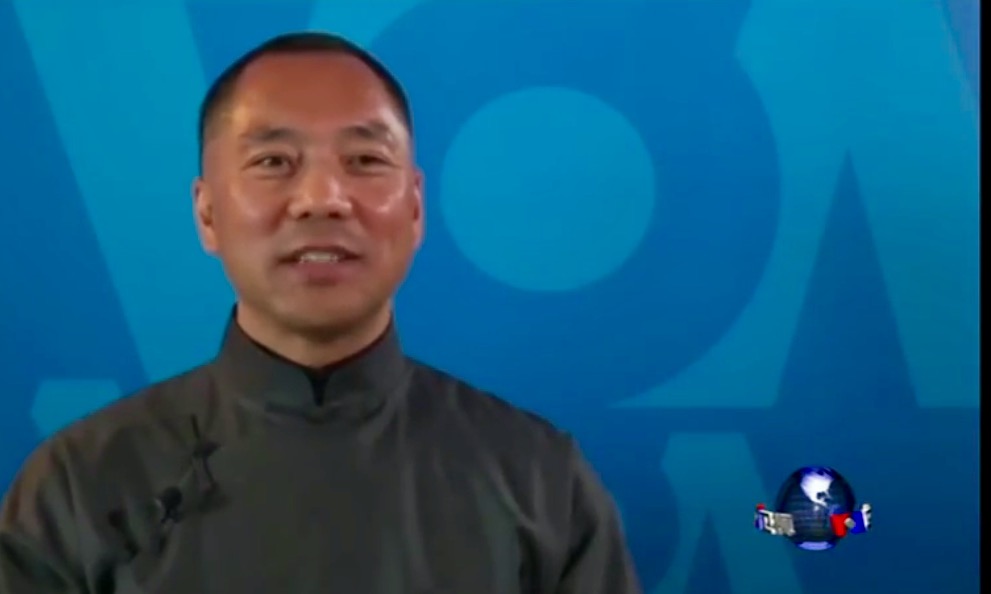
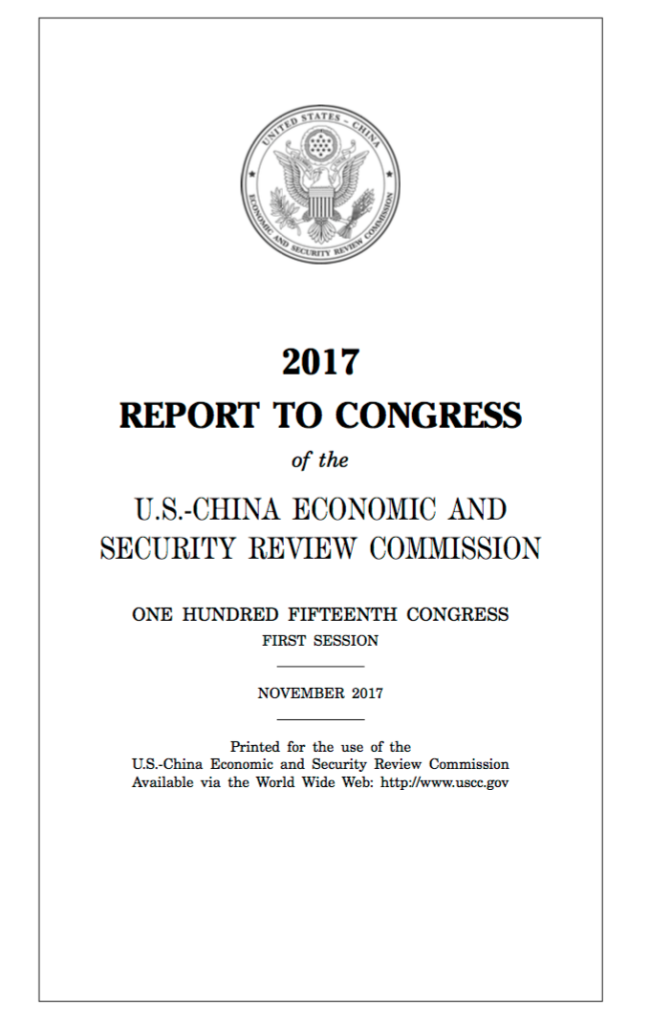
1 comment
Much detailed and very informative. Considering a lot contradictory news in the media,this report is helpful to understand the current events behind the Great Fire Wall built by Chinese government.
Comments are closed.